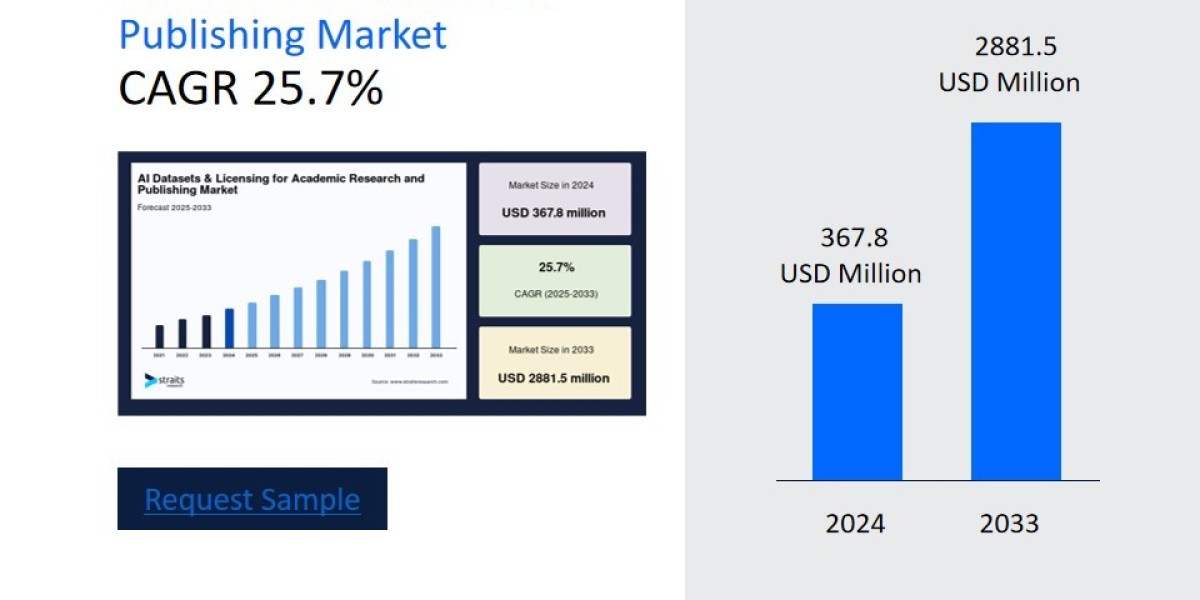Artificial Intelligence (AI) is rapidly reshaping the landscape for academic research, with datasets and licensing frameworks acting as critical catalysts for growth and innovation. Universities, research institutes, and academic publishers now rely extensively on access to high-quality, ethically-sourced datasets for machine learning, natural language processing, and data-driven analysis across every conceivable scientific field. As AI continues to mature, the dynamics of dataset development, licensing models, and global collaborations are unlocking new possibilities for academic breakthroughs.
According to Straits Research, the global AI datasets & licensing for academic research and publishing sector size was worth USD 367.8 million in 2024 and is estimated to reach an expected value of USD 462.32 million in 2025—growing to USD 2881.5 million by 2033, with a projected CAGR of 25.7% during 2025-2033. This powerful growth trajectory highlights the critical role AI datasets and licensing play in shaping the future of academic inquiry.
New Updates and Technological Advancements
In 2025, several countries and organizations have introduced cutting-edge advancements in dataset curation, interoperability, and licensing models. The drive toward open science has fueled the creation of more transparent, shareable datasets while ensuring compliance with privacy and intellectual property regulations.
Leading updates include:
Expansive open-access datasets tailored for academic, linguistic, and medical research released by organizations such as Zenodo (based in Europe), DataCite (Germany), and Figshare (UK).
Government-funded initiatives in Canada have accelerated the development of ethical AI datasets, supported by centers like the Vector Institute and CIFAR. These support rigorous data privacy and help academic researchers access and remix datasets for niche fields.
In India, new partnerships between academic institutions and technology firms have resulted in unique multilingual NLP datasets and surveys, such as those tracking AI tool usage among college students.
China remains a powerhouse, investing heavily in proprietary and open-access dataset production. Large-scale digitization initiatives, supported by the New Generation Artificial Intelligence Development Plan, ensure China’s central role in regional and global expansion.
Latest reports show cost and energy efficiency of model training have improved dramatically, reducing barriers for smaller academic teams to build and test sophisticated AI models.
Key Players and Regional Analysis
The AI datasets and licensing realm is defined by robust competition and collaboration between global players. Notable organizations include:
Elsevier (Netherlands, UK, US): Leading academic publisher, offering curated and licensed datasets for scientific research.
Springer Nature (Germany, UK): Owns data repositories and facilitates licensing for use in research and publishing.
IEEE (US): Maintains extensive datasets across engineering and technology disciplines, with careful licensing for academic projects.
Wolters Kluwer (Netherlands): Provides medical and clinical datasets.
Taylor & Francis (UK, US): Specializes in humanities and social science datasets, many with open licensing.
Zenodo (hosted at CERN, Switzerland): Free open-access repository, integral to European academic data sharing.
DataCite (Germany): Key facilitator of academic dataset management, fostering cross-institutional sharing.
Regional developments include:
North America: Remains the global leader, accounting for more than 39% of sector activity. The US maintains dominance thanks to robust intellectual property frameworks, federal AI research support (e.g., NSF, National AI Initiative Act), and collaborations between academia, startups, and tech giants.
Europe: Fastest growth, with emphasis on ethical standards and government-backed initiatives like Horizon Europe and the AI Act. France, Germany, and the UK are particularly active in developing and licensing educational and scientific datasets.
Asia-Pacific: Witnesses explosive expansion driven by China and India’s digitization policies, international academic partnerships, and domain-specific dataset creation. China’s integration of AI into education and research, coupled with India's focus on digital literacy and multilingual resources, is fueling unprecedented growth.
Middle East & Africa (MEA): UAE stands at the forefront with the Artificial Intelligence Strategy 2031, supporting dataset development and licensing for regional educational and smart city initiatives.
Growth Trends and Industry News
Several trends are shaping the future:
Increased partnerships between academic institutions and private companies to build bespoke datasets.
Expanding adoption of open licensing models, facilitating global research collaboration.
Growing volume of datasets designed specifically for AI fairness, transparency, and accessibility.
Strategic mergers, acquisitions, and alliances among top publishers and data providers to broaden reach and improve dataset quality.
The declining barrier to entry; inference costs for AI models have dropped over 280-fold since 2022, enabling smaller colleges and research teams to participate.
Recent news highlights surging optimism about AI’s transformative potential globally, with varying levels of public support. China, Indonesia, and Thailand report strong optimism; meanwhile, Europe and North America grow more positive year-on-year.
The Road Ahead
With continued growth and innovation, AI datasets and licensing for academic research are set to play an increasingly pivotal role—not only in accelerating scientific discoveries but also driving inclusivity and ethical practices worldwide. As nations and organizations collaborate to standardize licensing and enrich dataset quality, academic researchers can look forward to more powerful tools, interoperable resources, and greater global impact.













